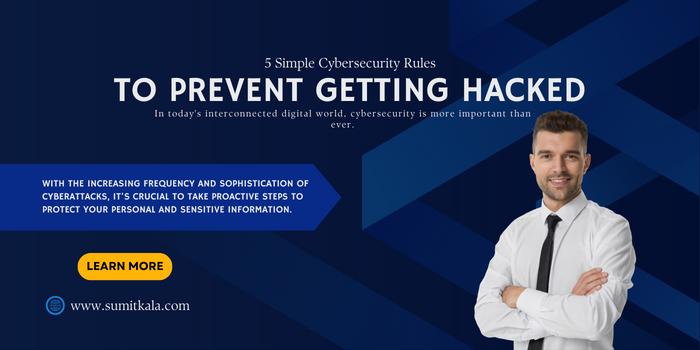
5 Simple Cybersecurity Rules to Prevent Getting Hacked

In today's interconnected digital world, cybersecurity is more important than ever. With the increasing frequency and sophistication of cyberattacks, it's crucial to take proactive steps to protect your personal and sensitive information. Fortunately, you don't need to be a cybersecurity expert to enhance your online security. Here are five simple cybersecurity rules that anyone can follow to prevent getting hacked:
Use Strong, Unique Passwords:
One of the easiest ways for hackers to gain access to your accounts is by cracking weak or reused passwords. To strengthen your defenses, create strong and unique passwords for each online account. Aim for a combination of upper and lower-case letters, numbers, and special characters. Consider using a reliable password manager to generate and store your passwords securely.
Enable Two-Factor Authentication (2FA):
Two-factor authentication adds an extra layer of security to your accounts. With 2FA enabled, even if a hacker manages to obtain your password, they won't be able to access your account without the secondary authentication method. This could be a one-time code sent to your mobile device or generated by an app. Always enable 2FA whenever it's available for your online accounts.
Keep Your Software Updated:
Outdated software can contain vulnerabilities that hackers can exploit. Ensure that your operating system, web browsers, antivirus software, and all applications are regularly updated to the latest versions. Many software updates include patches for known security vulnerabilities, so staying up to date is critical in maintaining a secure digital environment.
Be Wary of Phishing:
Phishing attacks are a common method hackers use to trick individuals into revealing sensitive information. Be cautious when clicking on links or downloading attachments from unknown sources, especially in emails. Verify the legitimacy of websites and emails before providing any personal information. Legitimate organizations will never ask you to share sensitive data via email.
Secure Your Wi-Fi Network:
Your home Wi-Fi network can be a point of vulnerability if not properly secured. Change the default router password, use strong encryption (WPA3 is recommended), and regularly update your router's firmware. Additionally, consider using a guest network for visitors to keep your main network more secure.
By following these five simple cybersecurity rules, you can significantly reduce your risk of falling victim to hackers and cyberattacks. Remember that online security is an ongoing effort, so stay vigilant and educate yourself about emerging threats and best practices. Protecting your digital life is not just a responsibility but also a crucial step in ensuring your online safety.